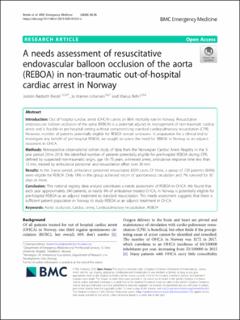A needs assessment of resuscitative endovascular balloon occlusion of the aorta (REBOA) in non-traumatic out-of-hospital cardiac arrest in Norway
Peer reviewed, Journal article
Published version

Åpne
Permanent lenke
https://hdl.handle.net/11250/2681089Utgivelsesdato
2020Metadata
Vis full innførselSamlinger
- Institutt for sirkulasjon og bildediagnostikk [1859]
- Publikasjoner fra CRIStin - NTNU [37177]
- St. Olavs hospital [2440]
Originalversjon
10.1186/s12873-020-00324-zSammendrag
Introduction: Out of hospital cardiac arrest (OHCA) carries an 86% mortality rate in Norway. Resuscitative endovascular balloon occlusion of the aorta (REBOA) is a potential adjunct in management of non-traumatic cardiac arrest and is feasible in pre-hospital setting without compromising standard cardiopulmonary resuscitation (CPR). However, number of patients potentially eligible for REBOA remain unknown. In preparation for a clinical trial to investigate any benefit of pre-hospital REBOA, we sought to assess the need for REBOA in Norway as an adjunct treatment in OHCA. Methods: Retrospective observational cohort study of data from the Norwegian Cardiac Arrest Registry in the 3- year period 2016–2018. We identified number of patients potentially eligible for pre-hospital REBOA during CPR, defined by suspected non-traumatic origin, age 18–75 years, witnessed arrest, ambulance response time less than 15 min, treated by ambulance personnel and resuscitation effort over 30 min. Results: In the 3-year period, ambulance personnel resuscitated 8339 cases. Of these, a group of 720 patients (8.6%) were eligible for REBOA. Only 18% in this group achieved return of spontaneous circulation and 7% survived for 30 days or more. Conclusion: This national registry data analysis constitutes a needs assessment of REBOA in OHCA. We found that each year approximately 240 patients, or nearly 9% of ambulance treated OHCA, in Norway is potentially eligible for pre-hospital REBOA as an adjunct treatment to standard resuscitation. This needs assessment suggests that there is sufficient patient population in Norway to study REBOA as an adjunct treatment in OHCA.
